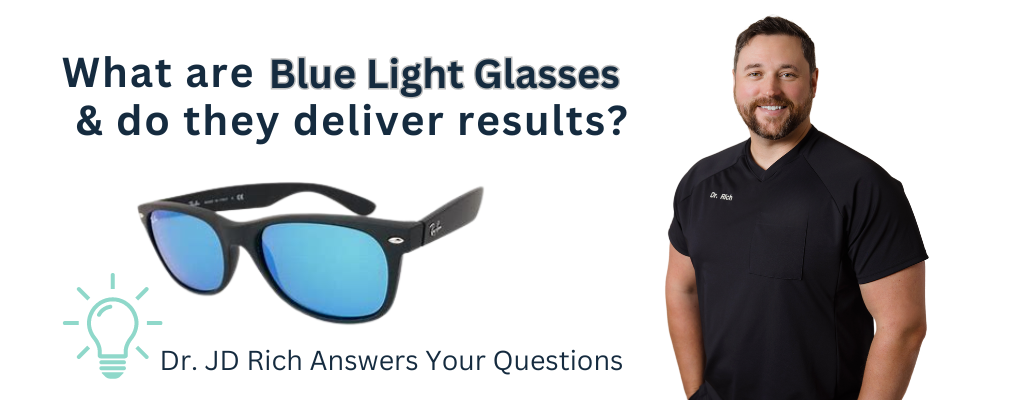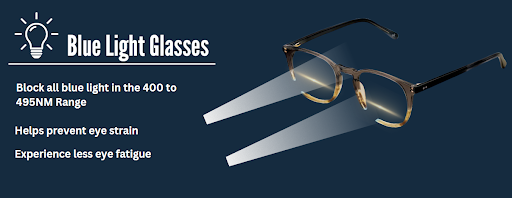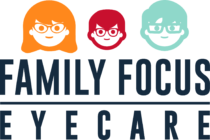
Blue light glasses have emerged as protective eyewear, coinciding with the widespread use of smartphones, tablets, and monitors. The COVID-19 pandemic has further increased screen time, with many individuals now working from home, resulting in digital eye strain and from sitting in front of computers or other devices throughout the day. On average, adults spend nearly 11 hours daily (or more) on devices, contributing to significant digital light strain on our eyes.
But what benefits exactly do blue light glasses offer? They aim to filter some of the blue-violet light emitted by screens. While prescription lenses often include ultraviolet (UV) light protection—crucial for shielding against damaging radiation—UV coating alone does not effectively block blue-violet light.
So, do blue light-blocking (also known as blue light-filtering) glasses actually deliver results? It’s a common question we receive from our patients at Family Focus Eyecare, so Dr. Rich is here to answer your questions.
What Are Blue Light Glasses?
Blue light glasses have specialized materials or lens surface coatings designed to block blue light and protect your eye health. Typically, blue light lenses feature an almost imperceptible yellow tint that filters approximately 40% of blue-violet light. The lightweight nature of this coating allows for comfortable all-day wear without drawing attention to the lens treatment.
For those needing extra protection, stronger filters with a more yellow tint are available. However, the trade-off is a noticeable color shift that might make them less ideal for everyday use.
Your eye care team can help you find the right blue light glasses for your needs. They’ll make sure the filters target the right kind of blue light and offer the protection you’re looking for.
Do Blue Light Filtering Glasses Deliver Results?
Screens emit a significant amount of blue-violet light, a factor linked to visual discomfort in various studies.
When it comes to eye comfort, especially after prolonged screen exposure, blue light glasses may be helpful. While some of our patients report significant improvement with these glasses, others don’t notice a substantial difference.
Further research is necessary to understand the long-term efficacy of blue light glasses.

Is Blue Light from Screens Hurting My Eyes?
Extended periods of gazing at digital screens often result in decreased blinking, leading to several temporary eye symptoms known as eye strain. Blue light exposure in the evenings may also disrupt sleep patterns for some individuals. However, the problem is caused by how we use screens, not the screens themselves. The best way to avoid tired eyes is to look away often and give our eyes a break.
Less screen time, adjusting phone settings, looking away from screens often, and following a good sleep routine can also help you sleep better. Whether or not you use blue light glasses, adopting eye-friendly screen habits is the best method for alleviating eye strain and combating digital eye strain.
Symptoms of digital eye strain include:
- Blurry vision
- Headaches
- Dry eyes
Prolonged screen focus may even trigger ocular migraines.
How Can I Alleviate Eye Strain?
Follow the 20-20-20 Rule
One simple yet effective strategy is the 20-20-20 rule: Every 20 minutes of screen use, take a 20-second break to focus on an object at least 20 feet away. Incorporating this rule into your routine, along with taking regular screen breaks and using your device’s dark mode, can work with your blue light glasses.
Maintain Proper Computer Screen Positioning
Keeping your eyes comfortable while using a computer requires good positioning. Hold your hand out as if for a handshake—this is the ideal distance, around 25 inches, to place your monitor from your eyes. Then, tilt the screen down about 15 to 20 degrees. This angle positions the center of the screen just below eye level, reducing strain on your neck and keeping your vision comfortable.
Increase Text Size
Reading small text can strain your eyes and lead to headaches. Increasing the font size can alleviate this strain.
Talk to Your Eye Doctor
If you’re experiencing symptoms of digital eye strain, talk to one of our optometrists for personalized guidance.
My Child Uses Screens All Day. Do They Need Special Glasses?
The same recommendations apply to children: encourage frequent breaks from screen time to alleviate eye strain.
Frequent breaks allow the eyes to rest and reduce the risk of digital eye strain. While special glasses—like blue light glasses—may offer some additional protection, they are not a substitute for taking regular breaks and practicing healthy screen habits.
If you have concerns about your child’s eye health, talk to your eye care team for personalized recommendations and guidance.
Can Blue Light Glasses Cause Headaches?
Generally, blue light glasses do not cause headaches if the prescription is accurate and the frame fits properly. However, if you do have headaches while wearing blue light glasses, it’s best to talk to an optician or eye doctor. They can double-check your prescription and glasses positioning to ensure they fit well.
Headaches can be a symptom of many other underlying issues, so it’s always best to consult with a medical professional if you are experiencing persistent headaches.
For those wearing non-prescription blue light glasses who experience headaches, verifying if the frame fits correctly is essential. In some cases, you may require prescription blue light glasses. An eye exam with your eye care provider would help determine this.
What Protective Eyewear Options Do I Have?
60% of blue light comes from the sun, so sunglasses can be an excellent tool for minimizing blue light exposure. However, our prolonged exposure to digital devices significantly increases our exposure to blue light.
Blue light tends to scatter, which is why the sky and ocean appear blue. Anti-reflective coatings can help combat this scattering effect and reduce glare, especially at night.
For added protection, blue light coatings can be applied to your glasses. These coatings not only filter blue light but also come with a 2-year warranty against scratches for prolonged effectiveness and durability.
Blue light glasses offer a promising solution to alleviate the strain caused by prolonged exposure to screens, with their specialized lenses effectively filtering blue-violet light. While the efficacy of these glasses may vary from person to person, incorporating them into a comprehensive eye care regimen can complement efforts to reduce digital eye strain and enhance overall visual comfort.
Can All Frames Have Blue Light Lenses Added?
At Family Focus Eyecare, we understand that everyone’s visual needs are unique, so we offer a diverse selection of customizable frames to accommodate different prescriptions and preferences.
Whether you’re looking for stylish frames or specific lens features like blue light protection, we have options to suit your needs. With years of experience and a range of offerings, we can help you find the perfect combination of eyewear and lens technology to address any concerns you have about blue light exposure and optimize your visual comfort and health.
At our Family Focus Eyecare locations in Columbia and Eldon, we are committed to helping you find the right protective eyewear options tailored to your needs, supporting your eye health and well-being.
Reach out to our experienced team today to explore how blue light glasses can benefit you and your family.


